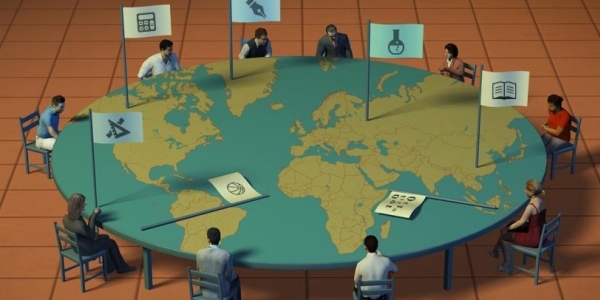I read her op-ed in the NY Times. I liked what she was arguing for:
I suppose I could have made the book a part of my summer reading. But, this is the first summer when I have taken off from any serious work. After years of M suggesting that I get out of my head, I implemented it. It feels like I have put down a huge weight that I had been carrying on all these years. I have no idea how people like Lepore keep going!My fave #PublicIntellectual, Jill #Lepore:— Am.Dr.Khe (@congoboy) May 26, 2019
"Nationalism is an abdication of #liberalism. It is also the opposite of #patriotism. To confuse #nationalism with #patriotism is to mistake contempt for love and #fear for valor."https://t.co/jHGe4q8TEN#tRump
But then even when I don't read books, I do read plenty of book reviews. This essay reviews Lepore's "This America: The Case for the Nation." Well, it is a twofer that also reviews "This Land Is Our Land: An Immigrant’s Manifesto," whose author is an Indian-American--Suketu Mehta.
I haven't read Mehta's book either; but, I have read his op-ed and have heard him articulate his argument.
— Am.Dr.Khe (@congoboy) June 2, 2019So, the review essay is not about books that will be unfamiliar terrain.
Nationalism is currently thriving, she believes, because the discourse of American liberalism is deficient. First, that discourse undervalues the radicality and relevance of the country’s founding ideals; second, the preoccupation with the rights of subgroups is essential, certainly, but politically inadequate; third, and here I put the matter much more crudely than Lepore would, liberals must in some sense do battle for possession of the Stars and Stripes. However gauche or complicit it may seem, they must understand and unapologetically frame their values—which currently have a niche, somewhat subversive emphasis—as our core national values:I am struck by the reviewer's blunt statement that "liberals must in some sense do battle for possession of the Stars and Stripes."
This America is a community of belonging and commitment, held together by the strength of our ideas and by the force of our disagreements. A nation founded on universal ideas will never stop fighting over the meaning of its past and the direction of the future…. The nation, as ever, is the fight.
"The nation, as ever, is the fight."
Right on, Professor Lepore!
"I claim the right to the United States, for myself and my children and my uncles and cousins, by manifest destiny.”
That was not me, but it is from Mehta.
This land is your land, this land is our land, it belongs to you and me. We’re here, we’re not going back, we’re raising our kids here. It’s our country now…. We’re not letting the bastards take it back.We certainly are not letting the bastards take it back. No way, Jose!
It’s our America now.
But, for us liberals and immigrants, the challenge is huge when it comes to fighting for the nation. Fighting for our nation.
If Lepore is right and the nation is indeed the fight, liberals must understand what a fight involves. That is, you can’t fight performatively when the other side is fighting to win: that kind of fight simply won’t go on for very long. You have no option but to fight to win, too. You want to win because you are right and they are wrong; because you have a moral right to power and they don’t; because you are real Americans and they’re not.Fight on!

